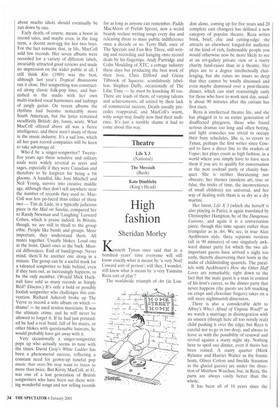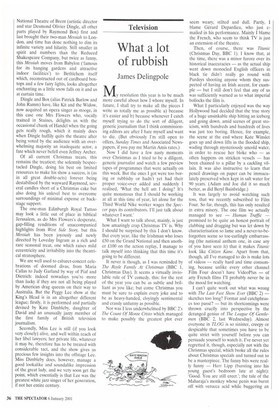Life X 3 (National) The Messiah (Bush) Kate Dimbleby (King's Head)
High fashion
Sheridan Morley
Knneth Tynan once said that in a hundred years' time everyone will still know exactly what is meant by 'a very Noel Coward sort of person'; will they, I wonder, still know what is meant by 'a very Yasmina Reza sort of play'?
The worldwide triumph of Art (in Lon
don alone, coming up for five years and 20 complete cast changes) has defined a new category of popular theatre. Reza writes brisk, brief, chic and cutting-edge: she attracts an elsewhere longed-for audience of the kind of rich, fashionable people you would otherwise now be more likely to see at an art-gallery private view or a starry charity fund-raiser than in a theatre. Her plays are to a degree intellectually challenging, but she raises no issues so deep that they cannot be totally discussed and even maybe dismissed over a post-theatre dinner, which can start reassuringly early for those who have to work next day, usually about 90 minutes after the curtain has first risen.
Reza is intellectual theatre lite, and she has plugged in to an entire generation of disaffected playgoers, those who found serious dramas too long and often boring, and light comedies too trivial to occupy their busy schedules. She is, to revert to Tynan, perhaps the first writer since Coward to have a direct line to the readers of Vogue; her plays count as high fashion, in a world where you simply have to have seen them if you are to qualify for conversation at the next cocktail party or charity banquet. She is neither threatening nor obscure; her themes (modern art, true or false, the tricks of time, the inconvenience of small children) are universal, and her way of dealing with them is as dry as a dry martini.
Her latest, Life X 3 (which she herself is also playing in Paris), is again translated by Christopher Hampton, he of the Dangerous Liaisons, and again it is a conversation piece, though this time square rather than triangular as in Art. We see, in true Alan Ayckbourn style, three separate versions (all in 90 minutes) of one singularly awkward dinner party for which the two allimportant guests have arrived a night too early, thereby discovering their hosts in the midst of childminding quarrels. The parallels with Ayckbourn's How the Other Half Loves are remarkable, right down to the fact that the male guest is a man in control of his host's career, so the dinner party that never happens (the guests are left snacking on crisps and chocolate fingers) takes on a still more nightmarish dimension.
There is also a considerable debt to Albee's Who's Afraid of Virginia Woolf? as we watch a marriage in disintegration with an unseen (though here all too noisily real) child pushing it over the edge; but Reza is careful not to go in too deep, and always to leave us with the possibility of renewal and revival against a starry night sky. Nothing here to spoil our dinner, even if theirs has been ruined. A starry quartet (Mark Rylance and Harriet Walter as the frantic hosts, Oliver Cotton and Imelda Staunton as the glacial guests) are under the direction of Matthew Warchus; but, in Reza, the parts are always vastly better than the whole.
It has been all of 18 years since the National Theatre of Brent (artistic director and star Desmond Olivier Dingle, all other parts played by Raymond Box) first and last brought their two-man Messiah to London, and time has done nothing to dim its infinite variety and hilarity. Still smaller in spirit and numbers than the Reduced Shakespeare Company, but twice as funny, this Messiah moves from Babylon ('famous for its hanging gardens and attractive indoor facilities') to Bethlehem itself which, reconstructed out of cardboard boxtops and a few fairy lights, looks altogether enchanting as a little snow falls on it and us at curtain time.
Dingle and Box (alias Patrick Barlow and John Ramm) have, like Kit and the Widow, now acquired an opera singer as stooge, in this case one Mrs Flowers who, vocally trained in Staines, delights us with the occasional chunk of Handel when the going gets really rough, which it mainly does when Dingle huffily quits the theatre after being voted by the audience with an overwhelming majority an inadequate actor, a fate which never befell even Jeffrey Archer.
Of all current Christmas treats, this remains the treatiest; the solemnly bespectacled Dingle, doing his best on limited resources to make his show a success, is (as in all great double-acts) forever being destabilised by the wayward Raymond, several candles short of a Christmas cake but also doing his unlevel best to overcome surroundings of minimal expense or backstage support.
The one-man Edinburgh Royal Tattoo may look a little out of place in biblical Jerusalem, as do Mrs Flowers's desperate, gap-filling renditions of unaccompanied highlights from West Side Story, but this Messiah has been joyously and newly directed by Loveday Ingram as a rich and rare seasonal treat, one which raises mild eccentricity and irritability into the theatrical stratosphere.
We are well used to cabaret-concert celebrations of doomed divas, from Maria Callas to Judy Garland by way of Piaf and Dietrich: indeed nowadays you're more than lucky if they are not all being played by American drag queens on their way to Australia. But the Peggy Lee show at the King's Head is in an altogether different league; firstly, it is performed and partially devised by Kate Ditnbleby, daughter of David and an unusually jazzy member of the first family of British television journalism.
Secondly, Miss Lee is still (if you look very closely) alive, and well within reach of her libel lawyers; her private life, whatever it may be, therefore has to be treated with considerable tact, and the show gives us precious few insights into the offstage Lee. Miss Dimbleby does, however, manage a good lookalike and soundalike impression of the great lady, and we very soon get the point, which essentially is that Lee was the greatest white jazz singer of her generation, if not her entire century.



















































 Previous page
Previous page